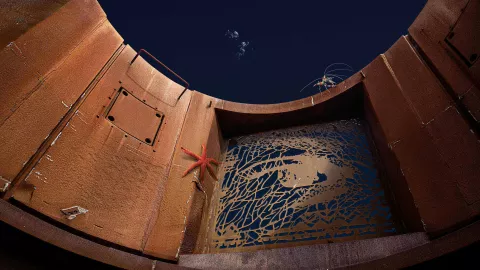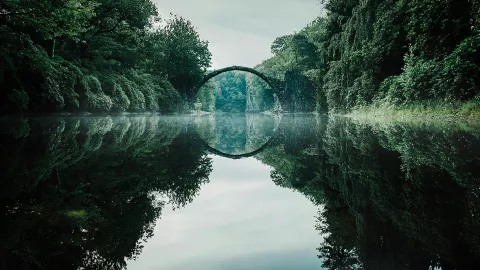In energy transition, the past can also help to build a more sustainable future. Vhils' project embodies EDP's purpose of supporting biodiversity.
Decarbonising. It is more than a word or ambition. It is effective action. EDP wants to be 100% green by 2030 and phase out coal by 2025. It will work entirely with sustainable sun, wind and water power. And decarbonising is not just about replacing fossil energy sources with renewable energy: our commitment to energy transition and the planet goes far beyond the closure of thermal power stations. It encompasses our strong concern for biodiversity and protecting the planet. The EDP Art Reef project, in partnership with Alexandre Farto aka Vhils, demonstrates how energy from the past can now be transformed to generate life at the bottom of the sea. An artificial reef, created with parts of old power stations, which can be visited by certified divers.
Shutting down power plants
EDP has constantly searched for new solutions, new technologies and new paths, in all the geographies where it is present. Aiming for a green and renewable future, we started decommissioning coal-fired power plants, such as Sines, in 2021. This is a complex process that involves careful treatment of all these facilities, the land where they are located and the equipment still in the premises. Reducing the carbon footprint of what is left from the past is a commitment to the planet, a commitment to a green future for society and the environment.
Recycling and reusing materials are EDP's goals in all its production sites. And the use of some of this equipment at EDP Art Reef brings multiple benefits. Pieces that helped produce energy for decades will be used to generate new life in the form of an artificial reef, helping to create a more sustainable future. Energy transition is a unique focus, but decades of EDP's history do not disappear with the end of the plants. History continues to be written in this project created by Vhils for the coast of Albufeira, as well as in many other initiatives across EDP's geographies.
At EDP, we believe that this is the moment to set in stone that we are committed to the future of the next generations. It has never been more important to switch from fossil fuels to renewable sources, promote the energy transition and ensure that it is done in a fair and inclusive way. EDP Art Reef, a pioneering project created by a great name in contemporary art, is a tribute to the past of the electricity sector and our country, but it is also a commitment to the future of all of us.Vera Pinto Pereira, EDP executive director
Sustainable art, constantly recreating
Vhils has made deconstruction his art form, removing layers of paint, paper, cement or tile from walls. Sustainability, the environment and the connection between people and cities have always been part of the artist's creative process. With EDP Art Reef, Vhils was able to give even more scope to his imagination, with the certainty that his art is promoting a circular economy and will also serve as a ground for the development of a new marine ecosystem, with the emergence of new lives.
Vhils built the 13 pieces for this underwater reef using materials taken from three dismantled EDP thermal power stations – Sines, Carregado and Soto de Ribera, in Spain. Iron and concrete, worked so as to be placed in the water without polluting the seabed, will form the basis of this reef. Off the coast of Albufeira, it will be open to visits by people with diving certification appropriate to the depth of the reef, or who are accompanied by certified divers.
Divided into six sets of various formats, the underwater exhibition – which also includes live corals germinated in captivity, so that nature renews itself more quickly – will evolve with the tides, varying with the seasons and the years. At a depth of more than ten metres and about a mile from the coast of the Algarve.
According to Vhils, "the opportunity to be able to reconvert material from dismantled EDP power plants makes it possible to access unique materials, with enormous historical significance, to assist in decarbonising and stimulating biodiversity through art".
EDP Art Reef is a long and challenging project, started by the Vhils team (Vhils Studio) and EDP in 2021, in a partnership involving dozens of people and various entities, such as Albufeira City Council, Turismo de Portugal, Albufeira Marina, Plant a Coral, the Centre for Marine Sciences of the University of Algarve (CCMAR/UALG), DGRM – General Directorate of Natural Resources, Safety and Maritime Services, APA – Portuguese Environment Agency, Navalrocha, Easydivers, Pinguim Sub and production partners such as Mota Engil, Lindo Serviços and AMOP. We are all committed to an initiative aimed at putting words into actions in terms of sustainability.
EDP Art Reef shows faces, footprints, urban and natural scenes. It intends to stimulate a reflection on the relationship between Humanity and the sea.
The project's dimensions, including its logistics and the size of the pieces, intends to have an equally profound impact on the local ecosystem. Sea life that will be born and grow, and then studied and monitored by researchers from the University of Algarve, and visited by divers from all over the world.
The idea of submerging installations made up of parts from dismantled thermoelectric power stations in the ocean carries a strong metaphorical weight, both in terms of raising awareness of the need for responsible use of resources, and in stressing environmental issues that need urgent response, and that derive from human activity on the planet. This project seeks to promote the development of innovative ways to create systems that establish a harmonious relationship with nature. Transforming these materials into an ecosystem conducive to the growth of coral reefs and the shelter of various forms of marine fauna and flora is an example of this approach. I hope that this is the first of many steps towards an increasingly conscious and sustainable future.Alexandre Farto aka Vhils
Energy transition for the future
In Albufeira, the EDP Art Reef project aims to transform the area into one of the main cultural recreational diving destinations, a pioneering landmark in terms of circular economy and reuse of materials. Creating a coral reef (a type of ecosystem that often serves as a barometer of pollution or the effect of climate change) from materials from an old thermal power plant, and at the same time turning it into art, is an example of how decarbonisation can involve the historical past and integrate it into nature, encouraging people to innovate in terms of sustainability.
Energy transition is a long but unstoppable process, a movement that must involve all of society: governments, companies, institutions, citizens. Producing sustainable energy is fighting for a greener world. Investing in water, sun and wind means taking care of people, but also of the environment and all of the planet's biodiversity.
We choose Earth
EDP sees decarbonising as a mission with no loose ends. We Choose Earth is a commitment we strive to accomplish in everything we do. We choose Earth in the biggest and in the smallest decisions. We choose Earth over haste, over convenience, time and time again. This choice, this absolute commitment to renewable energies, can also be seen on the canvases created by Carolina Piteira for the EDP Changing Tomorrow Now exhibition.
Diving into the sea, with Vhils as your guide, EDP Art Reef takes EDP's sustainability mission to a new level, combining art and biology. The oceans have long been a concern for the group, whether through the innovation of offshore wind projects such as the Windfloat, or photovoltaic projects such as Sunseap in Singapore; or through the awareness-raising present in projects such as EDP Surf for Tomorrow and EDP Atlantic Mission; or by supporting coastal cleanup initiatives such as the "Brigadas do Mar", or even underwater, such as support for the action "Em Defesa dos Oceanos", in Sesimbra. With EDP Art Reef, aside from raising awareness, we reuse materials and promote the circular economy, giving life to pieces that performed their function in the past and that today create a work of art and a new ecosystem. All in one single project.
At EDP, we face this decade with a sense of mission and urgency. The need to change our footprint today will be decisive to ensure a more sustainable, inclusive and fairer tomorrow. We have made an unprecedented commitment to the energy sector and to strengthening our connection with the communities in which we are present, and now it is time to reinforce this ambition and sense of duty towards society as a whole.Miguel Stilwell d’Andrade, CEO

